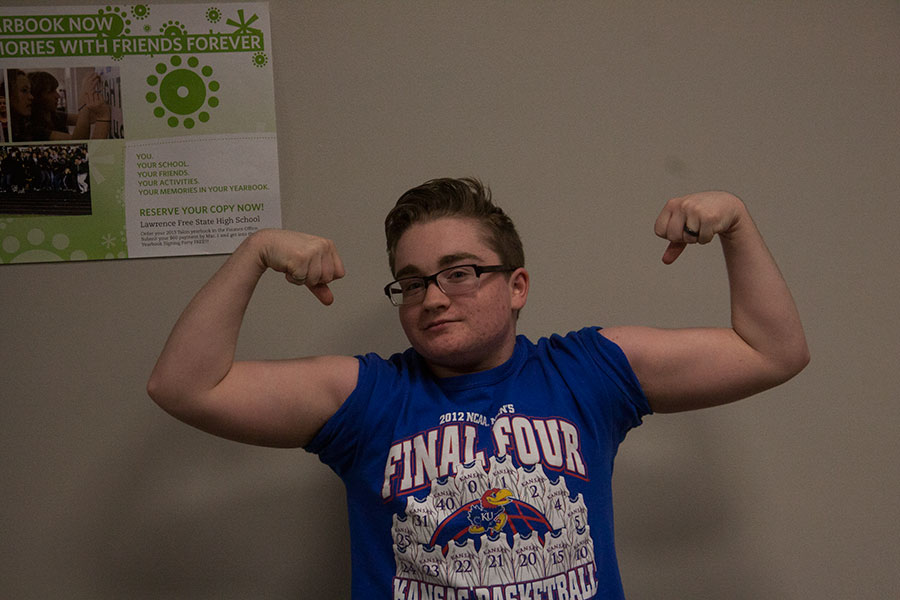While most high school students save up money for a car or college tuition, senior Malcolm Maddox finds himself collecting cash for a different cause: chest reconstruction surgery.
“That’s between $6,000 to $10,000 ,” Maddox said. “. . . I haven’t spent any money in like a year, and I don’t work anymore. It’s tough.”
Besides having to fundraise for his own surgery, Maddox is not an average teenager because he identifies as a trans* man.
“It began when I was four, is when I first told my mother,” Maddox said. “She thought nothing of it, she thought I was just a four year-old that didn’t know what he was talking about.”
10 years later, Maddox’s realization caused his formal transition into a male.
“I cut my hair [and] started doing vocal training to lower my voice,” Maddox said.
Additionally, Maddox began taking testosterone cream last fall, which has further lowered his voice and produced facial hair. He legally changed his name only recently, an inconvenient and costly process that required multiple trips to Missouri, Maddox’s place of birth.
“This whole ordeal is expensive,” Maddox said.
With no help from insurance, Maddox faces expenses such as $80 bottles of testosterone cream and the sky-high price of surgery.
“I’ve had fundraiser parties for that before,” Maddox said. “I’ve got about $2,000 saved up and I’m hoping to get more help from my parents.”
Fortunately, Maddox has not had to go through his transition on his own.
“I just got out of a relationship that almost lasted 2 years,” Maddox said. “ . . . She was with me every step of the way, extremely supportive, didn’t care that my voice was higher than other guys or a little bit different.”
Senior Dominique Sexton, who has been acquainted with Maddox since 7th grade, expresses her approval of Maddox’s transition because of the positivity she’s seen in his change of demeanor.
“I feel like finally he feels comfortable with himself,” Sexton said. “He seems a lot happier now.”
Maddox has found comfort in close peers as well as in a school club. He serves as the president of the Gay-Straight Alliance, marking his third year as a club participant.
“Thankfully at Free State I’ve faced only support,” Maddox said.
While Maddox has faced relatively smooth sailing on his difficult journey, others have not been so fortunate.
“A lot of other trans guys that are similar to me can’t afford a chest compressor,” Maddox said, “. . . and I help them finance that if they need it.”
Maddox has been able to reach out to other trans males via the website he created and the city-wide LGBTQ group he established. He aids others by providing emotional support along with financial help.
“Reaching out to other people was a big thing,” Maddox said.
This mentality is essential in an era where LGBTQs are often bullied or treated differently.
“I see other trans people that aren’t open and they get picked on immensely,” Maddox said. “Drop out of school, have to quit their job.”
According to a study conducted by the National Center for Transgender Equality and the National Gay and Lesbian Task Force, transgender individuals have a suicide attempt rate of 41%. Maddox’s positive disposition therefore makes him stand out from a group of people whose alarming misfortunes are not uncommon. Maddox attributes his success to his openness with his transition and ability to make light of his aberrant situation.
“I’ve been so open about it and I make it humorous,” said Maddox.
But Maddox has concerns for the future. As gay marriage issues appear on every other newscast, striking controversy across the nation, transgender matters are being overlooked. Malcolm urges people to reevaluate the priorities and not ignore the restrictions that continue inhibiting transgenders.
“Gay marriage is probably the least of my worries . . . I can be fired for being trans, I can be kicked out of my home, I can have my children taken away from me,” Maddox said. “That, to me, . . . is more important than having a wedding.”
Although Sexton has always believed in LGBTQ rights, being friends with Maddox has made her increasingly cognizant of how this group is treated.
“I just try and be more aware about things and just make sure that I’m not being either offensive or rude or ignorant about anything,” Sexton said.
In the wake of a changing culture, Sexton’s advice to treat people right is increasingly relevant. Equally as important is the inclusion of all people in this respect, not discriminating based on sexual orientation or variance within the LGBTQ status.
“Remember that the T in LGBT isn’t silent,” Maddox said.




![After receiving advice from her students, orchestra director Judy Erpelding marks her music. Although the director normally makes the artistic decisions, Erpelding will often consult her students and hear their opinions on what sounds good and what they should try out. “[The students] are the heart of the program, not me,” Erpelding said. “I know they will carry that on and I will miss them. Making great music with them, being able to challenge them, taking their inspiration.”](https://www.fsfreepressonline.com/wp-content/uploads/2023/05/Roust_Erpelding_5_11_23-600x900.jpg)







